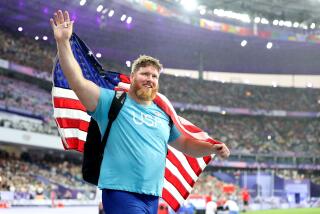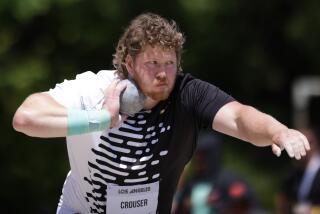Judge: Barnes Gets His Shot : Jurisprudence: West Virginia court says world record-holder should be allowed to try for team.
- Share via
CHARLESTON, W.Va. — A West Virginia judge ruled Monday that suspended shotput world record-holder Randy Barnes must be allowed to participate in the Olympic Trials this weekend at New Orleans.
Kanawha County Circuit Judge Paul Zakaib Jr. also ruled that track governing bodies cannot suspend athletes who participate against Barnes in the trials.
Zakaib ruled there were “serious and substantial defects” in International Amateur Athletics Federation procedures for testing urine samples.
Barnes, the 1988 Olympic silver medalist in the shotput, set the world record of 75 feet 10 1/4 inches in a meet at Los Angeles in May of 1990. He tested positive for steroids three months later at Malmo, Sweden, and was suspended for two years.
Barnes has maintained he is drug-free and criticized the test results.
“The IAAF rules are clear. He is ineligible for the Olympics and if people compete against him they will be suspended,” IAAF chief of staff Enrico Jacomini said from London.
Pete Cava, spokesman for The Athletics Congress, America’s governing body for track and field, said he anticipated his agency would appeal the ruling.
“I think the only judge who hasn’t ruled on these trials so far is Judge Wapner,” Cava said from New Orleans. “We broke new ground in sports last week with the Butch Reynolds decision, and I’m not sure now where this will lead to.”
TAC President Frank Greenberg said he didn’t know what effect, if any, the Barnes suit would have on the shot put, scheduled for Friday.
“It would be hard for me to say anything. I have not--nor do I know anyone else from TAC who has--received a copy of the ruling.
“To the best of my knowledge, Mr. Barnes has not met the qualifying standards for his event. And as far as I know, as distinguished from the other (Reynolds) incident, no TAC panel has found in his favor.”
Reynolds won an order from the U.S. Supreme Court on Saturday ordering that he be allowed to compete in the trials.
Jacomini said Barnes never appealed to the IAAF.
“He is completely innocent of the charges, and we’ll prove that later in court,” said his lawyer, Anne Shaffer of Charleston. “He is a world record-holder, and he deserves to be at the Olympics.”
An appeals panel of TAC upheld Barnes’ suspension in April of 1991, but criticized the drug-testing procedure and officials who handled Barnes’ urine sample.
Also Monday, Barnes filed a $50-million lawsuit in Kanawha County Circuit Court against the IAAF, TAC and its West Virginia chapter over the handling of his drug test at Malmo. A hearing wasn’t immediately set.
Shaffer said West Virginia courts have the authority to issue orders against the IAAF and TAC because both sanction events in the state and “therefore are considered to be present and operating in the state.”
The groups can appeal to the West Virginia Supreme Court, she said.
Shaffer said the appeal wasn’t sparked by Reynolds’ success, although the Reynolds case has “paved the way for Randy and other athletes.”
“A lot of the facts are very similar. There are test results of steroid use that cannot be confirmed by the IAAF and TAC,” Shaffer said. “They cannot prove that it is their urine that was tested.”
Barnes was training Monday in Houston and didn’t attend the hearing. The IAAF and TAC also weren’t represented at the hearing.
Jacomini said there “seems to be no respect for the rules.”
“It’s a rule established for 200 countries and not just the United States. And it’s a rule accepted by the IOC (International Olympic Committee) and all sports bodies in the world,” Jacomini said.
“This kind of ruling makes the fight against doping much more difficult.”
More to Read
Go beyond the scoreboard
Get the latest on L.A.'s teams in the daily Sports Report newsletter.
You may occasionally receive promotional content from the Los Angeles Times.






